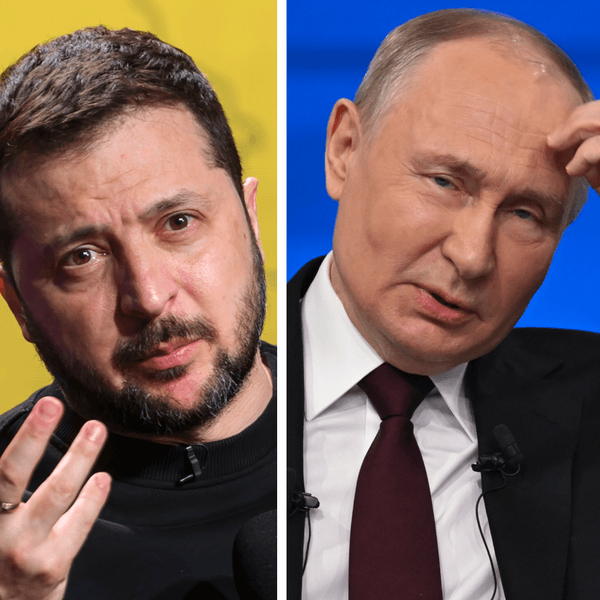The end of the Cold War had an odd effect on U.S.-Russia non-proliferation efforts. With tensions between the two powers at a relative historical low, Presidents George W. Bush and Donald Trump broke with their predecessors and scrapped treaties that constrained the countries’ nuclear arsenals, which remain the world’s two largest by far.
The result? Only one U.S.-Russia nuclear agreement is still in place: the New START Treaty, which puts a modest cap on both Washington and Moscow’s ability to deploy strategic nuclear weapons.
As soon as President Joe Biden took office, he extended that agreement until 2026, but disagreements over inspections during the Covid pandemic, not to mention Russia’s decision to invade Ukraine, have left it in peril.
Luckily, that looks set to change. On Tuesday, the State Department announced that talks aimed at extending and strengthening the treaty will begin soon, marking the first such meeting in over a year. The news comes just days after the White House revealed that national security adviser Jake Sullivan has held secret meetings with top Russian officials in recent months.
Though success is far from guaranteed, the New START talks could be a major venue to reduce risks of nuclear escalation between Moscow and Washington, a fear that has loomed large during the Ukraine war.
These negotiations could also have the added benefit of expanding contacts between Russia and the United States, which have reportedly dropped off dramatically since February. An increased number of interactions between the powers won’t necessarily lead to anything concrete in the near term, but it could allow diplomats to test each other’s positions and see if there is greater room for negotiation than we originally anticipated, especially when it comes to the conflict in Ukraine.
Meanwhile, calls for diplomacy are growing as Western officials become more and more convinced that neither Kyiv nor Moscow can win outright on the battlefield, according to NBC News. The report also noted that, during a recent visit to Kyiv, Sullivan “did broach the idea of how the conflict can end and whether it could include a diplomatic solution.”
American pressure has reportedly already had an effect on Ukraine’s stance toward talks. Following reports that Washington asked Kyiv to soften its position, Ukrainian President Volodymyr Zelensky dropped his demand that negotiations could only take place once Russian leader Vladimir Putin was removed from power, according to Politico.
Russian and Ukrainian demands remain far apart, but, with winter fast approaching, many hope that they will use an expected slowdown in fighting as an opportunity to start talking. And, as Moscow’s troops have continue to withdraw from Kherson, a key city in the south, Kyiv could push for negotiations from a position of military strength.
That may be the view shared by the United States and NATO, according to an unconfirmed report from Italian newspaper La Repubblica, which claimed this week that American officials have begun to tell their allies that “if and when Kherson is regained, then negotiations can be started.”
Gen. Mark Milley, the chairman of the Joint Chiefs of Staff, lent credence to La Repubblica's scoop Wednesday when he said that Kyiv and Moscow should "seize the moment" to end the war during the likely lull in hostilities.
In other diplomatic news related to the war in Ukraine:
— Russian authorities took U.S. basketball star Brittney Griner to a penal colony to serve out a nine-year sentence for marijuana possession after Griner lost an appeal in Russian courts, according to the Guardian. Washington considers Griner a political prisoner and has worked in recent months to negotiate her return to the United States. On Wednesday, Biden said he is “determined to get her home and get her home safely.”
— On Tuesday, the Kremlin continued to cast doubt on whether it would extend the Black Sea grain deal, which has allowed ships to carry food from Ukraine to world markets, according to AP News. “We are very dissatisfied with how the Russian part is being implemented,” said Russia’s deputy foreign minister, arguing that sanctions have made it impossible to carry out parts of the deal meant to allow for increased exports of Russian grain and fertilizer. Notably, Moscow claims that it will not impede Black Sea shipping even if parties to the deal fail to renew it.
— Russia announced that Putin will not attend next week’s G20 meeting, possibly due to recent military setbacks in Ukraine, according to the New York Times.
— Pope Francis has acted as a mediator between Ukraine and Russia in recent prisoner swaps, according to Italian outlet Askanews. Moscow’s ambassador to the Holy See praised the pontiff’s role in talks, saying that he “is carrying out a very important humanitarian mission that allows hundreds of people to return to their families.”
— A Ukrainian parliamentary delegation is set to visit Washington next month in a move aimed at shoring up bipartisan support for continuing aid to Kyiv, according to the New York Times. Lawmaker Volodymyr Ariev, who is organizing the delegation, said that one of his key goals is to convince Congress to expand its oversight of U.S. military and economic aid in order to “lift suspicions we heard during the campaign that it is not transparent.”
U.S. State Department news:
In a Monday press conference, State Department spokesperson Ned Price called on Russia to signal that it’s ready for talks with Ukraine. “It is incumbent upon Russia to signal its willingness and its readiness to sit down to engage with the Ukrainians,” Price said. “Instead, the only signal Russia has sent is one of death, is one of destruction, is one of continued brutality.”















